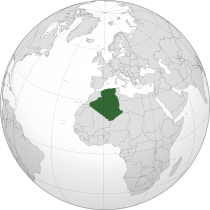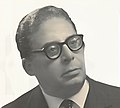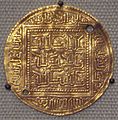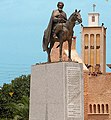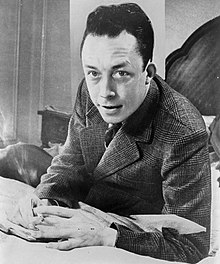Portal:Algeria
 The Algeria Portal
Algeria, officially the People's Democratic Republic of Algeria, is a country in the Maghreb region of North Africa. It is bordered to the northeast by Tunisia; to the east by Libya; to the southeast by Niger; to the southwest by Mali, Mauritania, and Western Sahara; to the west by Morocco; and to the north by the Mediterranean Sea. Algeria has a semi-arid climate, with the Sahara desert dominating most of the territory except for its fertile and mountainous north, where most of the population is concentrated. Spanning 2,381,741 square kilometres (919,595 sq mi), it is the world's tenth largest nation by area, and the largest nation in Africa. With a population of 44 million, Algeria is the tenth-most populous country in Africa, and the 32nd-most populous country in the world. The capital and largest city is Algiers, located in the far north on the Mediterranean coast. Algeria's official languages are Arabic and Tamazight; French is used in media, education, and certain administrative matters. The vast majority of the population speak the Algerian dialect of Arabic. Most Algerians are Arabs, with Berbers forming a sizeable minority. Sunni Islam is the official religion and practised by 99 percent of the population. (Full article...) Selected article -The Algerian Civil War (Arabic: الحرب الأهلية الجزائرية), known in Algeria as the Black Decade (Arabic: العشرية السوداء, French: La décennie noire), was a civil war fought between the Algerian government and various Islamist rebel groups from 11 January 1992 (following a coup negating an Islamist electoral victory) to 8 February 2002. The war began slowly, as it initially appeared the government had successfully crushed the Islamist movement, but armed groups emerged to declare jihad and by 1994, violence had reached such a level that it appeared the government might not be able to withstand it. By 1996–97, it had become clear that the Islamist resistance had lost its popular support, although fighting continued for several years after. The war has been referred to as 'the dirty war' (la sale guerre), and saw extreme violence and brutality used against civilians. Islamists targeted journalists, over 70 of whom were killed, and foreigners, over 100 of whom were killed, although it is thought by many that security forces as well as Islamists were involved, as the government had infiltrated the insurgents. Children were widely used, particularly by the rebel groups. Total fatalities have been estimated at 44,000 to between 100,000 and 200,000. (Full article...)General images -The following are images from various Algeria-related articles on Wikipedia.
Did you know
Selected biography -Albert Camus (/kæmˈuː/ kam-OO; French: [albɛʁ kamy] ⓘ; 7 November 1913 – 4 January 1960) was an French philosopher, author, dramatist, journalist, world federalist, and political activist. He was the recipient of the 1957 Nobel Prize in Literature at the age of 44, the second-youngest recipient in history. His works include The Stranger, The Plague, The Myth of Sisyphus, The Fall and The Rebel. Camus was born in Algeria during the French colonization, to pied-noir parents. He spent his childhood in a poor neighbourhood and later studied philosophy at the University of Algiers. He was in Paris when the Germans invaded France during World War II in 1940. Camus tried to flee but finally joined the French Resistance where he served as editor-in-chief at Combat, an outlawed newspaper. After the war, he was a celebrity figure and gave many lectures around the world. He married twice but had many extramarital affairs. Camus was politically active; he was part of the left that opposed Joseph Stalin and the Soviet Union because of their totalitarianism. Camus was a moralist and leaned towards anarcho-syndicalism. He was part of many organisations seeking European integration. During the Algerian War (1954–1962), he kept a neutral stance, advocating a multicultural and pluralistic Algeria, a position that was rejected by most parties. (Full article...)
Selected cuisines, dishes and foods - Related portalsWikiProjects
{{{contents}}}
CategoriesSelect [►] to view subcategories
Things you can do
New articlesThis list was generated from these rules. Questions and feedback are always welcome! The search is being run daily with the most recent ~14 days of results. Note: Some articles may not be relevant to this project. Rules | Match log | Results page (for watching) | Last updated: 2024-05-15 19:30 (UTC) Note: The list display can now be customized by each user. See List display personalization for details.
Algeria topics
Associated WikimediaFind this theme on other projects coordinated by the Wikimedia Foundation, Wikipedia hosting provider:
| ||||||||||



